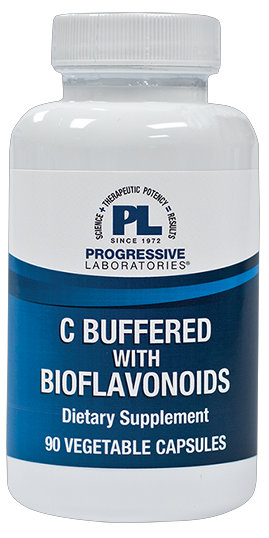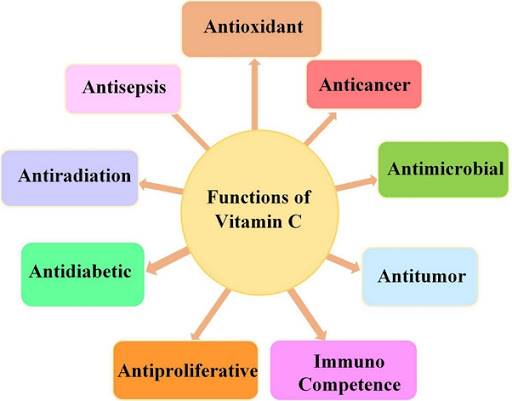Buffered Vitamin C

Vitamin C: The “Simple” Nutrient That Quietly Determines How Well You Age
Most people ignore Vitamin C because it feels basic — something you “already know.” That’s a mistake. Vitamin C is one of the body’s most demanded daily essentials: it supports tissue repair, immune resilience, and the cellular defenses that help you stay strong year after year. When Vitamin C runs low, the body doesn’t just “miss a vitamin” — it starts operating with less protection and less rebuilding power.
What Is Buffered Vitamin C?
“Vitamin C” sounds interchangeable—until you try to take it day after day. Buffered Vitamin C is Vitamin C formulated to be gentler and more usable in real life: an Ascorbate/Threonate Complex paired with a Citrus Bioflavonoid Complex, selected to help support how the body absorbs and utilizes it.
Why You Should Consume Buffered Vitamin C
Because Vitamin C only helps when you can take it consistently. Buffered Vitamin C is designed to be easy to tolerate and easy to assimilate— so you can keep your daily intake steady without the stomach discomfort many people associate with harsher, more acidic forms.
And source matters. This Buffered Vitamin C is sourced from real citrus—limes and oranges— not corn-derived sources (as is common in many mass-market Vitamin C products).
Your cells can’t swallow your good intentions. They can only use what you give them—every day. So don’t ‘mean to’ get Vitamin C… make it show up.
Vitamin C may look “simple,” but it plays a foundational role in daily health. When intake is low, the body has less support for normal protection and repair. The aim isn’t excess—it’s staying consistently well supplied.
- The public has been taught from elementary school onward to think “minimum.” The body, however, lives on “supply" so it can find in the blood stream what it needs to function optimally.
- A small amount of Vitamin C may keep scurvy away — but that’s not a good modern health strategy.
- If Vitamin C is daily infrastructure, then the winning move is simple: keep the tank consistently filled—not occasionally flooded.
A Vitamin C RDA is basically the “just-get-by” number (the "don't get sick and die this year" number) — it’s the minimum amount to keep you alive, not help you feel amazing at 70, 90, or 110.
Vitamin C supports the things we care about as we age: repair, resilience, circulation, and staying active. Here are a few reasons it deserves a real spot in your day — not an afterthought.
- Inflammation makes everything feel harder — and Vitamin C can nudge that dial. In one UC Berkeley-led trial, people taking about 500 mg/day for two months saw an average 24% drop in CRP (C‑reactive protein), a common lab marker for chronic inflammation. I like that because it’s not “vibes.” It’s a number you can actually test.
- “A little more” Vitamin C was linked with “a lot better” outcomes in big population data. In a nationally representative group of 11,348 U.S. adults followed for about 10 years, the people with the highest vitamin C intake had substantially lower death rates — especially from cardiovascular causes (men: about 42% lower cardiovascular mortality; women: about 25% lower). And the best part? The “high intake” group averaged roughly ~300 mg/day. That’s not some extreme megadose lifestyle — it’s just consistently doing better than bare minimum.
- Low Vitamin C tends to show up where you really feel it: blood flow and circulation. A report in Circulation found vitamin C levels were lower in people with peripheral arterial disease, and lower levels were linked with higher CRP and greater disease severity. In other words: when circulation is struggling, vitamin C often looks like it’s running low too.
- Vitamin C isn’t just “extra” — it’s structural. Researchers used it when they were actually measuring arteries. In a classic serial-arteriography study (they took real follow‑up images of arteries over time), the treated group used 500 mg of ascorbic acid three times daily (1,500 mg/day). The authors called the early results encouraging (and yes — preliminary). But here’s the point: when you stop guessing and start measuring, vitamin C keeps showing up as a serious “repair-and-structure” nutrient.
- And here’s the frustrating part: Americans are drifting away from it. One NHANES-based analysis found vitamin C intake from foods and beverages dropped about 22.6% from 1999–2000 to 2017–2018. So while we’re trying to age well, one of the simplest daily nutrients is quietly disappearing from the modern routine.
Practical takeaway: Don’t aim for “just enough to get by.” Aim for supported, steady, and strong. Vitamin C is one of the easiest daily upgrades you can make — especially through vitamin C–rich foods. And if you choose to supplement, our Buffered Vitamin C is a mineral ascorbate form with bioflavanoids that is gentler on the stomach.
Bottom line: the minimum prevents scurvy. Smart people aim higher — for steady Vitamin C status, steady repair, and steadier health.
Nature didn’t treat Vitamin C as “optional.” Most animals in the wild manufacture it continuously inside their own bodies — day and night, without missing a dose. (That design choice is a clue: Vitamin C is meant to be a steady daily supply, not an occasional afterthought.)
- Fruit bats, guinea pigs, primate monkeys and humans are the only ones that do not make Vitamin C inside their bodies, but must eat it.
- All the rest of the animal kingdom make Vitamin C internally in order to protect themselves from pathogens, and from free radicals and toxins and to support collagen production and tissue formation. The amount of Vitamin C produced in the bodies of animals daily is equivalent to 5 grams of Vitamin C for a human adult. (Of course, that's more important for animals since so much of their food is "dirty" and needs the detoxifying power of Vitamin C.)
- An abundance of research shows that a decline levels of serum Vitamin C corresponds to aging and decline in function. That means keeping Vitamin C levels high is a primary consideration for staying youthful.
- Besides helping the immune system function at a higher level, maintaining high levels of Vitamin C is also absolutely essential to maintaining vascular integrity, normal blood sugar, ample collagen production, organ and skin health.
- Without adequate Vitamin C, tissues to not repair optimally. Since most people don't eat at least 2 grams a day (most eat less than 300 mg per day), most people are losing their health, quality of life and longevity because their bodies cannot repair themselves as fast as could otherwise occur.
- Vitamin C is important for energy. It plays an integral role in the production of cellular energy, and is essential for the proper metabolism of carbohydrates and the synthesis of fats and proteins.
- Vitamin C is not a “nice-to-have” — it’s a daily repair nutrient. It supports healthy immune function, helps the body respond to tissue stress, and plays a role in normal cholesterol metabolism. Our Buffered Vitamin C is paired with naturally occurring citrus bioflavonoids — including rutin, hesperidin, and quercetin — because Vitamin C works better with its natural partners. Together they create a tag-team antioxidant effect that is stronger than Vitamin C alone.*
- Collagen is your body’s scaffolding — and Vitamin C helps build it. Vitamin C is essential for collagen formation and stabilization. When Vitamin C is low, collagen cross-linking can suffer — and connective tissue becomes weaker and less resilient.
- Wound healing depends on Vitamin C. Vitamin C serves as a cofactor in the synthesis of collagen and other connective-tissue components the body uses to repair skin, gums, blood vessels, and supporting structures.*
- Bioflavonoids amplify Vitamin C. Because bioflavonoids share complementary mechanisms, they can potentiate the effect of ascorbic acid.* Vitamin C and bioflavonoids both support immune function, connective tissue formation, cellular energy production, and antioxidant activity.* Many modern stressors raise the need for Vitamin C, including smoking, alcohol use, chronic stress, diabetes, environmental toxicity, and certain medications.
- Vitamin C also supports the brain. It functions as a cofactor in the synthesis of key neurotransmitters involved in focus and drive, including dopamine and norepinephrine.*


What Are Optimal Doses of Vitamin C?
There are plenty of opinions about Vitamin C — and there’s the official “minimum” meant to prevent disease conditions. But the real question isn’t minimum. It’s optimal: how much Vitamin C does your body need to stay consistently well supplied so repair, resilience, and antioxidant protection can run at full strength? That number isn’t identical for everyone. It rises with real life — infections, inflammation, stress, toxins, and chemical exposure. Some researchers have argued that in a relatively clean environment, an “optimal baseline” could look like about 500 mg every 5 hours — not because you’re sick, but because Vitamin C is used quickly and the body works best with a steady supply.
- Think of the RDA for Vitamin C like a poverty line: below which people cannot survive. It’s not a personalized target for thriving. For vitamin C that baseline is about 75–90 mg/day for most adults. However, if you want a truly vibrant life, don't think about not dying because of a lack of Vitamin C, instead think about thriving through an abundance of it. Aim higher by making vitamin C–rich foods a daily non‑negotiable, and if you choose to supplement, choose an amount thoughtfully (and responsibly) based on your body, lifestyle, and guidance—because “minimum” thinking is how people keep their health impoverished instead of choosing a best life.
- Two-time Nobel laureate Linus Pauling—one of vitamin C’s most famous champions—advocated daily intakes in the 2–10 gram (2,000–10,000 mg) range, a high-dose approach that remains debated and may not be advisable for everyone.
- Think of nature's Vitamin C benchmark: wolves and cats don’t “take” Vitamin C—they make it. Scaled to a human-sized body, that internal production as roughly 5,000 mg per day (a comparison that helps put “high-dose” numbers in context).
- Even though Vitamin C is essential to health, many people don't consume it because the acidic nature of Vitamin C can irritate sensitive stomachs. With our buffered Vitamin C, most people can get an optimum amount of Vitamin C without the fear of stomach sensitivity issues.
How Much Vitamin C is in a Capsule of Buffered Vitamin C?
- 500 mg per capsule.
Three capsules or 1,500 mg (one capsule every five hours) is the amount recommended by the manufacturer. Double that amount is occasionally taken by people who are recovering their health, and even more therapeutically. Due to the buffered nature of this product, one can consume a great many capsules with less worry about stomach sensitivity. However, at higher amounts, please check with your health professsional. Each bottle contains 90 capsules, enough to take three capsules per day for a month. Never exceed bowel or gastric tolerance (meaning if one gets diarrhea, or stomach upset, then reduce the dose).
What Are the Ingredients in Buffered Vitamin C?
- Vitamin C (as Calcium Threonate/Calcium Ascorbate Complex). This form of Vitamin C is well assimilated, releasing a small amount of calcium that buffers the stomach linings, Threonate is an active metabolite of Vitamin C and stimulates the uptake of Ascorbate (Vitamin C). This is an exciting form of Vitamin C due to its virtually complete assimilation.
- Citrus Bioflavonoid Complex: Hesperidin, Rutin, Quercetin. These other natural Vitamin C bioflavonoids additionally buffer the stomach from any sensitivity to Vitamin C ascorbate. They are powerful antioxidants and potentiate the effect of the ascorbate.
Buffered Vitamin C Ordering Form
Forever Friends Price: $24.00
Buffered Vitamin C
|
||||||||||||||||||||||||||||||

How to UseOne to three capsules daily. If taking more than one capsule, separate by 4 to 5 hours
|
Videos and Audios about Buffered Vitamin C
We disclaim any claims (if there are any) made in these videos or audios. They are for information, education, enlightenment and entertainment only.


